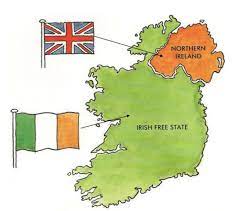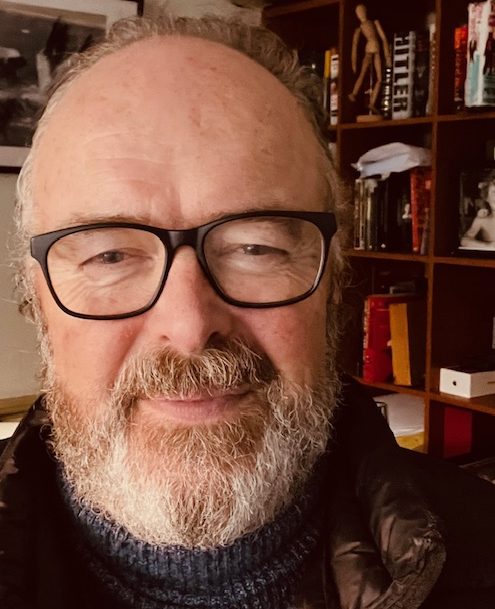
I was brought up in a small u unionist home. We had all the trappings, including half the family being from Ballymena. We watched the 12th parade sitting on the Lisburn Road. I went to schools that were mono-cultural. My Sundays consisted of putting on my church outfit, going to Church and Sunday school. At home, there was not much talk of politics until 1968, when even though only ten, I started to see the news taking a much bigger role in my life.
Then the Troubles started. Civil Rights marches, shown on the black and white news, with a family commentary that already laid the blame for the RUC clubbing people with batons at the feet of those being attacked, because they shouldn’t have been there.
From then on, it was a single fault situation. If people wanted to be part of the Free State they should go and live there. The Army should just go up to the Falls and sort things out. At school, we had one Catholic in our year. I can’t repeat what we said after Bloody Sunday. Until I went to Queens to study history and politics in 1977 I was at one with the accepted Protestant view that our country was being ravaged by the IRA, for no other reason than they wanted a United Ireland.
And to this day we still hear that version of events. The Troubles were the IRA. The Loyalists use words like defender in the titles of their organisations, forgetting that the people attacked in the first major riots in ’69 were the Catholics in mixed estates and areas.
The Unionists had a chance. The introduction of Partition included proportional representation in the Act of 1920. The first two elections to the NI Parliament were held using PR. But by 1929 it was gone. The UK abolished local government electorates being decided by property ownership after WW2. Unionists kept it to suit their purposes. (No demands to be exactly the same as GB then.) Ironically this meant that a higher number of Protestants were disenfranchised, so the Orange card kept the working class in check, but proportionately it affected the Catholic population more. The impact of that control affected jobs, housing, and prosperity. It was in the interests of Unionists to make Unionists more prosperous, to buy more property, to keep the power in their hands.
In Derry, a Nationalist majority resulted in a Unionist council of twelve seats to eight. Our old friend Gerry Mander at his work. IN 1922 the Parliament of NI removed PR from the elections for local government and then redrew the boundaries so that they held power. Twelve councils that had been Nationalist became Unionist. The shifting of Northern Ireland’s second University from Derry to Coleraine was predicated on keeping the Derry gerrymander working. As well as just pure sectarianism.
The concept of having second class citizens was the norm. Both communities knew it was the case. Jobs in manufacturing and engineering were disproportionately Protestant. In public sector employment there was an overall balance, but once the grades and therefore levels of remuneration come into play, in 1968 out of 1,095 senior employees, only 130 were Catholic. 30% of Derry’s administrative, clerical and technical staff were Catholic. IN Dungannon, there were none. IN Fermanagh no senior council positions were held by Catholics. From 1921 to 1968 one Catholic reached the position of Permanent Secretary in the NI Government. One. DOwn to the rank of a staff officer, only fourteen out of 229 were Catholic. In 1969, six of the sixty-eight judicial appointments were Catholic.
There is more evidence. if you want to read it here.
The Unionists owned all the political power in Northern Ireland, from elected representation to the implementation of policies by the civil service, all the people were from one community, and were acting in the interests of that community. Add in the day to day discrimination, Protestant business owners employing Protestants. They justified this with sectarian tropes, “Catholics don’t want to work” excusing them not giving them the opportunity. “Catholics work in bars.” I know personally how the old school tie works, having attended RBAI. People looking for opportunities for their children get in touch with friends from school. They are not necessarily being deliberately discriminatory, but it is a by-product, as all their friends from school are Protestant in upbringing.
The attempts by the Nationalist politicians to act in the interests of their electorate were stifled at every turn. Equality was non-existent. A one-man-one-vote system did not deliver democracy in Northern Ireland, and neither was it expected to, as seen in the setting up of the state to have PR. The UK government recognised that they needed to create a state that did not discriminate. The Unionists decided otherwise, and it is the fault of the UK Government that they were allowed to create the Protestant state.
The Civil Rights movement was born from necessity, not desire. Had the first 50 years of NI been as planned when set up, with equality as a central plank, there would have been no need. Had the Stormont Unionists removed the property requirements for local elections, there would have been a fair system. Had the hard-line rejection of Civil Rights led by Ian Paisley not made it impossible for Stormont liberal Unionists to make the changes that were needed and were of natural justice, then we would be in a different place.
But Unionists did not want a fair system. They were are remain afraid of equality. So when you listen to the hard-right attacks on Sinn Fein and Dublin, remember, the blame lies where it falls.
This is not a justification of any violence, but a reality check on the history, that is ignored for political reasons.


all so very true & I just wish more Protestants, a minority of Catholics & the free state privelege would at least acknowledge the truth of the matter.
LikeLike